The Dodd-Frank legislation and stress test, do nothing to stop systemic-risky financial institutions from blowing up the economy again. Bill Black joins theAnalysis.news with Paul Jay.
Paul Jay
Hi, welcome to the Analysis News. I’m Paul Jay, and please again, don’t forget the donate button, but also let me add a thank you everybody who already didn’t forget the donate button. We’re at over a thousand and some odd donors, and it still astounds me that so many people are donating, but if you are watching or listening and you haven’t donated, then you might want to come over and click donate. If you’re on YouTube, you can hit the subscribe button and the share and let people know. I’ll be back in a minute with a continuation of my series of conversations with Bill Black on financial fraud and be back in a second. So as I said, I’m continuing my discussions with Bill Black on the modern history, you could say, of financial fraud in the United States. Bill is an American lawyer, an academic and author, a former bank regulator. He’s the author of the book The Best Way to Rob a Bank is to Own One, which is the title of this series of interviews. He’s an associate professor of economics and law at the University of Missouri, Kansas City. Thanks for joining me again, Bill.
Bill Black
Thank you.
Paul Jay
So we left off last segment and once again, let me say go back to part one and watch them all because it’s really worth it. It’s been a great education for me and I think you’ll enjoy them. It’s not often you enjoy listening to the history of economics, but Bill makes it so. At any rate, we left off the Obama administration is now in power and you quote someone from the administration essentially that says that to go after individual bankers would destabilize the financial system. So, it’s not just that the banks institutionally are too big to fail, which I think if that’s a true proposition, that’s the argument for nationalization in some form or another because you shouldn’t allow these financial institutions to be able to blackmail the entire society, but that being said, even if that proposition is true, it’s not true that individual bankers are too big to go to jail, but that’s how they were treated. So maybe you pick up the story from there.
Bill Black
The person who indicated we had to be really worried about prosecuting senior bankers was Lanny Breuer. Lanny Breuer was head of the criminal division appointed by Obama and Holder. So he was the most important person indirectly making policy. So he ensured that there would be catastrophic failure, but it’s a little weird because when the Obama administration comes in initially, it does one thing right, and this is something that the Bush administration had done as bad as it’s possible to do, and that was at the level of attorney general Mukasey. The FBI, who recall gave one of the big warnings in September 2004, saying there’s an epidemic of mortgage fraud and it’s going to cause a financial crisis and recall that in response, not a single regulator calls him or takes any action. The premier law enforcement group in the world.
So the FBI comes back and says to Mukasey, Attorney General under Bush, the way you’ve got this set up is a recipe for failure because what we know works, the thing we used in the savings and loan debacle, the thing we used in Enron is task forces, and there are essential to dealing with large amounts of really sophisticated fraud. And you need to have a task force against mortgage fraud. And Mukasey refuses and he refuses on the grounds that and I quote, “it’s just the equivalent of white-collar street crime,” and of course, it was because he had to assign people not to look in the C suite, but to look at the little guys, the loan brokers and such at the absolute bottom of the totem pole. He said, well, these cases are trivial. Thanks, Mick, you told us to look only at trivial cases and with virtually no people. So there were a hundred and twenty FBI agents at peak in the savings and loan debacle, and recall the savings and loan debacle because we contained it was a pimple, whereas we were dealing with stage IV cancer in the great financial crisis. To deal with a pimple, we had a thousand FBI white-collar specialists. To deal with this unbelievable disaster, they sent one hundred and twenty folks. So that absolutely guaranteed failure and then they said, don’t look at anybody important, only look at the tiniest people in the food chain.
Paul Jay
At this point, the “they” is the Obama administration.
Bill Black
No, this is the Bush administration, Bush 2 administration.
Paul Jay
Just to add one little piece to this. In 2004, when Bush gets reelected after the complete disaster of the Iraq war, I asked the guy, I can’t say his name, but he’s a billionaire and he knows all the elites and all the rest, and I said, how do you guys elect such a complete disaster of a president? How do you reelect him after Iraq especially? And he says because he let us rob the piggy bank, we got to do anything we wanted while he was off doing Iraq.
Bill Black
Well, again, this is the same president who took the guy [Roland Arnall] that this series has explained was the last survivor of the savings and loan debacle, fraud plus predation strategy. Who goes to the shadow financial sector becomes the largest purveyor of fraudulent loans in the world. Then over the opposition of the federal regulators, the state attorney generals get together collectively to get a fine against it, and at the end of that process, it’s the biggest fine for consumer fraud and predation against blacks and Latinos in the history of the United States of America. And as I say, everybody gets this question right. And then we prosecuted him, option A or B, we made him our ambassador to the Netherlands because he was Bush’s leading contributor. So, yes, they literally paid him to be able to loot the banks, and then they were rewarded even when they were caught.
So it would have been so simple for the Obama administration to be the heroes. It was set up for them to be the heroes. All they had to do was what they said they were going to do. And as I say, their first act was to unwind this insane decision by the attorney general under Bush, Mukasey, that forbade any task force and they created a task force, so good right? Again, we know exactly how to succeed. You need criminal referrals from the agencies, you need the task force, and you need to prioritize the absolute top people, whereupon they decided to do none of that.
So they decided almost immediately that they weren’t even going to try to bring criminal cases. They turned it into a civil case and then they said on top of that, we’re not going to sue the CEOs, and the CFOs, and the people in the C-suite, that got incredibly rich by blowing up our world economy and predating on blacks and Latinx folks. We will virtually eliminate such suits. There were only about six against prominent folks. To give you a contrast, again, remember the pimple, the savings and loan debacle, hundreds, over eight hundred individual suits against folks in that case. All our cases were against individuals. Instead, the Obama administration decided we’ll just sue the bank and we’ll only sue it civilly. Now, let’s see. Oh, I used to be a lawyer. I still am, but I’m in recovery. It’s a long process when you’ve been a litigator. Here’s the deal. I sue the bank, you’re the CEO. None of the money comes from you, all of the money comes from the bank and then the Justice Department walks away and does nothing to me. What do I care about agreeing to a settlement? Of course, I’ll agree to a settlement. It ain’t my money. It’s the shareholders’ money and on top of that, the money was perfect for the Obama administration because it sounded big, but it was unbelievably trivial compared to the size of this organization. This is another, more subtle point about too big to fail. It means it’s you’re too big to deter.
Paul Jay
Wasn’t there another piece to this fine? That while they were paying what sounded to any normal human being, like a large fine, they were getting practically free money through quantitative easing from the Fed.
Bill Black
They were getting so many different things Paul, but yeah, bring me back to that in a moment.
Paul Jay
The fines were meaningless to them.
Bill Black
Well, here is the proof of that. Remember, these are guys that purport to believe in markets. In virtually every case when the settlement was announced, the stock price went up. So the markets gave their judgment, which was haha, we’re dealing with morons, right, and morons who don’t want to win, because after all, remember what these institutions actually did. They didn’t cause kind of large losses. They caused literally a trillion dollars in losses. Now, as we’ve explained in the series, banks had virtually no capital and that which they had was massively overstated. So could we have really large fines equivalent to the damage that caused? Well, no, because they’d all fail, right, and we’ve already said we can’t have you fail. So in addition to what I’ve described in terms of the negotiation dynamics, I also know as defense counsel representing the bank that you’re never going to ask for anything remotely close to the damages I actually caused because then my bank would fail. Plus, as you say, the federal government is sending shitloads of money to all the major banks.
Paul Jay
There are no other words to describe it. So I think that is scientifically what it was.
Bill Black
That is how we say it precisely in economics, at least as informed by criminology. So if the money was going to come, it would have to come from the federal government to pay the own fine to the federal government. Now on top of this scam, it’s in the interest of both parties to make the numbers sound high. So this is a super freebie. All the settlement numbers you heard were vastly inflated because what they included in them was the frequent thing that you actually do as a lender, as Donald Trump emphasized in the first Republican debate for the nomination, he said all the greats default all the time, meaning real estate developers. That is a virtually direct quotation, and so I’m proud that I stiffed my creditors in all of these things. So what you really do and then there’s a whole thing in accounting on this is you do a settlement in which you reduce the lender’s payments. It’s called a troubled debt restructuring, a TDR in jargon, and then there are unique accounting things that make this suite where you don’t have to recognize losses immediately when you do one of these TDRS. But it’s a common-sense thing, right? You don’t want to foreclose when you could just cut a deal because foreclosures are expensive to keep the person in and you reduce the rent, the mortgage payment a bit, you stretch it out from 30 years to 40 years, those types of things. So banks were going to do literally millions of those deals anyway. They got to count those deals that they were going to do anyway as part of the settlement. And those numbers represent billions of dollars. So, yes, that number that they always sent out with their press release sounded very large, but you had to cut it by 40 to 50 percent in many cases, even to see what the actual fine was, but again, we knew the fine was going to be trivial and we knew the fine wasn’t going to be paid by the people that were enriched by the fraud.
So there was by design zero personal accountability and zero effective deterrence. That’s a smart system. That’s how they teach us to do things in the enforcement business. Did I mention again, I was an enforcement head in a federal agency. We never did this because it’s stupid. Of course, it’s not stupid. It’s designed to be stupid. It’s designed to do two things. It’s designed to do nothing to these people that, after all, put you in the White House with their political contributions and to appear that you did something, but the market sees right through it. That’s why the stock price goes up in virtually every case. So personal accountability…the Obama administration is where it went to die in terms of Wall Street. They simply eliminated it.
Paul Jay
So they didn’t do anything about institutional or individual accountability in real terms, certainly institutional effectively and nothing in terms of charging individuals. Did they do anything legislatively or even in terms of regulation that would stop it all from happening again?
Bill Black
No is the short answer. But also you raise an additional point. There are other ways to hold people personally accountable. You hold a Pecora-style hearing, right? Pecora was the person that did the investigation in the Great Depression that blew the lid off of what the banks did, where he would personally bring in the top bankers in America, sit them for hours, not with a stupid question, you see three minutes at a time by one member and then another party, but a skilled prosecutor asking hours of cross-examination. Right, and he decimated these people in front of the people of the United States, that’s not obviously as good as prosecuting, but that is an important form of personal accountability, none of that. So we had Dodd-Frank. There was a huge legislative response. The legislation killed enormous amounts of trees, and then the regulations that they insisted be developed killed other forests of trees, but all those hearings, who did they bring in front of them and hold personally accountable for the frauds? It’s easy to remember because the answer is zero, of course. So they had an opportunity with all of those congressional hearings and, they simply refuse to even try to do it, the regulators could have brought enforcement actions personally, against the individuals. They could have removed and prohibited them from the industry, they could have brought cease and desist orders, that in essence, fine the CEO and the other C Suite officers directly, we did thousands of those actions, individual actions, thousands of those. They did virtually none in response to the great financial crisis against individuals.
Paul Jay
I remember there were hearings where they dragged the CEOs of the big financial institutions in front of them. Were there some individuals like Elizabeth Warren or a few others that actually asked some real questions?
Bill Black
Yes, but that’s a later problem. So Carl Levin did hold some real hearings. They’re still way unduly polite. They never used the F word. The F word here is the five-letter F word: Fraud. They never do that type of thing. But he did have some good questioning of the Goldman Sachs person, the Goldman Sachs guy had come across as a complete liar in that, and you don’t always have to say, hey, he’s a liar. You can just hold up a painting, sometimes a moving picture that shows that there’s a liar. So you’re right. There was a little bit of this. There was a congressional oversight bureau and there were three appointees. Elizabeth Warren was one of them, and you can see that there was some questioning there, but none of the people understood control fraud or predation and such, and again, they’re more polite affairs and none of them got any major publicity.
So, no, there are different ways of holding people personally accountable if you’re not going to prosecute them, as I said. The federal agencies religiously didn’t hold them accountable. There are I think three exceptions to that. There’s a Securities and Exchange Commission action against Mozilo, the head of Countrywide, but they settled that for virtually nothing, and virtually all the money came from the bank, actually from the banks’ insurers. There’s this thing called director and officer liability insurance. And there was one on WAMU, Washington Mutual, which, again, they settled for virtually no money coming from the individual. So, yes, they tried it a couple of times, but their heart wasn’t in it and they were exercises in futility, and nobody even remembers unless you’re a really weird wonk that these things occurred. You could interview 5000 people and you wouldn’t get a single one that knew that there was SEC action against Mozilo or an FDIC action against WAMU.
Paul Jay
OK, so Dodd-Frank was supposed to be the big piece of legislation that was going to create the kind of regulatory framework. So all of this too big to fail and all this doesn’t happen again. So one did it. And then two, I know I’m jumping ahead a bit, but under Trump, there was, I thought they kind of took apart anyway. But let’s start with, did Dodd-Frank actually have the teeth to stop it from happening again?
Bill Black
No. So you talked earlier about too big to fail. They have a different jargon. They call these things systemically important institutions. Of course, the opposite is true. Their analytics really say it’s a systemically dangerous institution, that as soon as the next one blows up, it will blow up the world economy, and there are globally roughly thirty of these institutions. So we’re rolling the dice every day. And they will periodically blow up, so that’s insane, right? As a policy, and it’s more insane than you’ve even let on in your statements because forget nationalization for the moment. Why the hell do you allow something to be systemically dangerous? There’s no reason to allow it to be that large. Most economists think there are no economies of scale that you gain by letting it get really large. So what the hell are you doing, letting them get so large? You say you can’t exceed $50 billion in assets or $100 billion. That would be good for the world and it would dramatically reduce this kind of thing. That’s called systemic risk. They would absolutely refuse to do that. Instead, we have this hilarious that says basically you’re supposed to have and I quote “a living will” that says, hey, if I’m about to blow up, here’s what you ought to do, but none of us can foresee the circumstances in which you’d be about to blow up.
Paul Jay
This is part of Dodd-Frank.
Bill Black
It’s part of Dodd-Frank, these living wills, but there could be literally millions of circumstances. So what the hell is my living will supposed to say, sell this asset, buy that. I mean, it’s all insane. Also, they created a new body that was supposed to look at risk. This new body is filled entirely with economists and statisticians, the people who get it absolutely wrong and absolutely incredibly light. The thing that is the early warning system, always, is loan underwriting. And they did nothing to aid loan underwriting virtually, and the bankers that run the federal agencies are hostile to underwriting and they love listening to these economists preyed on about risk models. So our big thing is stress tests. This is Geithner’s baby, and that’s his book, Stress Tests. So what he doesn’t tell you is what do all of these institutions have in common, the three Icelandic giant banks, Fannie, Freddie, AIG, and a host of others? Well, they all had stress tests just before they failed and they all passed them glowingly. Fannie and Freddie pitched this, and I’m not making this up as a nuclear winter scenario. That even in the equivalent, the financial equivalent of a nuclear winter, they’d come out smelling like roses. Obviously, they were insolvent immediately and such. So these stress tests were a pure PR device and the Obama administration people to this day are incredibly proud of themselves, that they conned the American people by having a “stress test”. They were smart. The first one, a couple of folks slightly failed them. That’s good, right? Credibility and the second iteration, virtually everybody passes, so we don’t have to worry, you just got this equivalent of the cardiogram, you can go out and pump iron and run and all those good types of things, have sex. It’ll all be good.
But these stress tests are jokes, everybody knows they’re jokes, they have always been jokes, they failed completely in the great financial crisis. They will fail in the future. That was the bright idea that they had behind these things. And then they had a thousand ideas like, you know, China let a thousand flowers bloom thing, and some of them are good ideas, but there are a friggin thousand of them and they created a bill, that does have some good ideas, but it’s insane. Why would you dump all of this stuff? Like you don’t want a system that is immensely complex because who’s going to win? The biggest banks.
Paul Jay
But isn’t that the point? They’re so complex no one can understand it but the biggest banks. So you need those peoples’ expertise to deal with this crazy complexity you helped create. Then and number two, if you don’t have individual accountability, then what’s the point of it all anyway?
Bill Black
Right. So to translate viewers, when I say insane, I don’t mean mentally deranged. I mean, it’s designed to be insane in this context. So, yes, and what was the thing just before the great financial crisis. So Europeans. Any Europeans or non-Americans watching this? How come the great financial crisis was so incredibly severe in Europe? Overwhelmingly, the crappy loans, not entirely, Ireland, Spain, and other places used the same fraud schemes that American banks used, but the crisis in Europe was even worse than the crisis in the United States. How the hell did that happen when most of the losses were in the United States? Well, it comes from exactly what you said, Paul. They had this super bright idea, guess what, the big banks suggested it and they said – they being the international financial regulators, the Basel process as it’s called – said what a great idea. They said we’ll invite you guys, the big banks’ quant guys inside the tent to make the capital rules and only you guys. I know it will shock you, Paul, but they came up with a new risk-based system unique to the systemically dangerous banks, only about 30 in the world, they had a special standard and again, heavily in Europe, and this special standard was the bank will create the model that decides how much capital the bank needs. Again, the giant banks only get to create their own models. And I know it will shock you, but in every case, these models said we don’t need no stinking capital. They literally produce capital requirements in the range of about one and a half percent.
Paul Jay
What should it have been?
Bill Black
Well, no capital ratio would have worked for frauds, but it should have been 20, to give you an idea of magnitude. This is precisely because, again, these are the roughly thirty institutions that pose a systemic risk to the global economy. So they should have much higher capital requirements than other folks and instead, they virtually eliminated them. Now, here’s a good news story. There haven’t been many of them in the series. The FDIC fought a ferocious rearguard action in which the head of the FDIC.
Paul Jay
The Federal Deposit Insurance Corporation.
Bill Black
Federal Deposit Insurance Corporation and I know it will shock you, a woman did the right thing and said, no, hell no, this is insane, and she was called a Luddite in the press, again, a wrecker, and of course, I’m blanking on it. I will get it for you, but. She [Sheila Bair] said, no, hell no, and the FDIC fought, and they fought and they fought, and the Fed, the Federal Reserve Bank, the Federal Reserve Board. Their economists were the leaders of saying, yes, great, this is what we need to do and the Fed is much more powerful than the FDIC normally, but the FDIC did studies and said this is going to virtually eliminate their capital requirement. This is insane. And so it was never imposed in the United States, but Europe did begin to adopt it, and so as terrible as leverage, again, leverage is debt to equity, so as terrible as the leverage was of the U.S. banks, European banks on average were twice as debt-burdened as U.S. banks and so when the great financial crisis hit, they had nothing to stand and, huge numbers of them were swept away.
Paul Jay
OK, so we’re going to kind of move ahead because I want to make sure we get to in the next segment all focused on today. So the Obama administration, you’ve explained. So I’m assuming that Trump, who we know is the friend of the working family and working man, came in and cleaned the swamp. He cleaned all this up on behalf of working people, am I right?
Bill Black
Yeah. He ran against that terrible fact of having Goldman Sachs people and then he put three of them in his senior leadership on day one. So, of course, Trump is the swampiest of the swamp creatures, and he sought to gut any rules that did make any sense that he inherited from the Obama administration. But mostly the legislation was so bad, so enormous, that it never could do anything. So finance is actually not his biggest area of swampy behavior. He just put in people that didn’t care to enforce anything. What they really did worst was something we haven’t been emphasizing, but one of the most important forms of deregulation ever was deregulating interest rates. Right, and this was again done actually begins under Carter and culminates under Reagan. We’ve already explained that that was the key to the massive growth that any little bird bank that has federal deposit insurance can grow by 100 percent tomorrow by just offering a slightly higher interest rate, but it also allowed predation because now you could charge 500 percent interest rates. Literally, payday lenders charge over 500 percent interest rates in the United States, and by the way, I was just looking at the UK last night, actually, this morning about 4:00 a.m. and they are very proud of the legislation that they adopted on payday lenders because they discovered payday lenders were charging over 3000, in some cases 5000 percent annual percentage rate of interest, and they adopted a reform that caps it at 1300 annual percentage rate of interest.
Paul Jay
What happened to the laws against loan sharking?
Bill Black
Oh, those people aren’t allowed to compete. Those laws remain, but your friendly bank is the loan shark and the payday lenders, of course, were the huge ones. Anyway, that was in fairness, and it’s good that you brought this up, the best thing about Dodd-Frank was the creation of the Consumer Financial Protection Bureau, and that was Senator Warren’s baby. Geithner tried very hard to kill it, but Obama actually stayed with Senator Warren on that one. Paul Volcker was very important, apparently, as part of this process as well. So for the first time, we had a consumer agency that its mission was to protect the consumer. If you’re the FDIC, the Office of Comptroller of the Currency, the Federal Reserve, that kind of got added a little bit on, but they don’t even bother as the leadership, you never have them say our mission is to protect consumers.
So this agency was set up that way and it was set up with funding protected because the Fed is a money maker and each year returns not hundreds, tens of billions of dollars to the Treasury, and so they siphoned off a little of that, and that was smart because Congress and this is partizan, Republicans for over 20 years have waged a war to eviscerate the Securities and Exchange Commission and the Commodities Futures Trading Commission, the CFTC, which is supposed to regulate financial derivatives, and my mentor, Henry Pontell actually developed this theory in criminology decades ago. It’s called systems capacity or incapacity, where they deliberately create a system in which there is no capacity for the regulators or prosecutors to succeed. For example, now hyper frequency trading, trading, and literally in nanoseconds is the vast bulk of all trades, and it’s really dangerous and stupid to the system, and it doesn’t have any benefits to society, just individual sleaze. So we clearly ought to be regulating it, and it helped produce flash crash, that did bring down the system for at least a day. So we obviously should be dealing with this. The Republicans have ensured that the SEC the CFTC do not have sufficient resources to buy the computer capacity to even analyze after the fact the crises.
Just to put this in concrete terms, this is people speculating not just on things like silver and you name it, but wheat, I mean food and artificially driving up the prices of food often and not speculating necessarily, but what we call frontrunning, which is, oh, we know that somebody else, one of our clients is going to make an order, we’ll get in front of them because we know that order will move price up or down and we’ll capture the profit instead of them, and we know that there are all kinds of very sleazy stuff we should be studying because the vast number of hyper frequency trading are what we call way out of the money, they’re not anywhere near market prices, and at best, that’s a search feature where they’re trying to find something out about other people, but almost certainly it’s a manipulative device and a deceptive device to send false signals. We don’t want to send false price signals. The whole idea of a market is to send honest price signals and make it function better. So, again, Congress, Republicans in Congress are deliberately making it so that we cannot effectively even understand what these people are doing, much less counter it.
Paul Jay
And there was I remember, a big fight at the Commodity Futures Trading Commission to try to establish position limits so nobody could control, I think it had been previously twenty-five percent of any particular commodity and commodity means stuff we really use, and that’s not an abstraction, and I think they finally passed the position limit that was within somewhat more reasonable and then it got overturned in federal court if I remember correctly.
Bill Black
Yeah, but also, again, these bids are so massively greater than position limits because they’re not going to end up in an actual position and they’re designed to deceive, we think. Now, if it isn’t, why not give us the money to be able to study the damn things and say, oh, they do have some benefit. They don’t want it studied. So pretty much I don’t think that’s true.
Paul Jay
So under Trump, did it get worse or it just continued to sort of deteriorate?
Bill Black
It just continued to spiral in the drain type of thing. The big guys are typically getting much, much, much bigger. So these crises aren’t something that happens every day and they tend to be ones in which not one of the big guys, but a half dozen of the big guys or more all get in trouble at the same time. And the fact that one hasn’t occurred in the last 10 years, well, of course, we wouldn’t expect it to do so, but it also can be bad news. In other words, when you go a full 14 years between crises, again, it’s the magic of exponential growth. If you’re growing 50 percent a year, it looks like a hockey stick.
Paul Jay
OK, so this is the reason we’re doing this series of interviews because it’s not just a nice history lesson. The point is, is that the systemic danger, may not only exist, and may even be more dangerous.
Bill Black
That is greatly amplified since the great financial crisis.
Paul Jay
OK, so in the next segment, we’re up to the Biden administration. They’re talking about reform. Are they actually taking steps? Are they making appointments? And I’m proposing this as what the next segment is going to be. I’m going to ask, Bill, is there anything encouraging all this? And so far, everyone points to the appointment of Gary Gensler, who was at the Future Trading Commission, but I’m not sure how much power he’s going to wind up having. Anyway, next segment is more or less the final segment, because the segment is going to be what’s the Biden administration doing and what should they be doing and what in Bill’s view, what kind of regulation might actually prevent another massive crisis from coming. So thank you, Bill.
Bill Black
Thank you
Paul Jay
And thank you for joining us on theAnalysis.news don’t forget the donate button and all of that.
MOVIE EXCERPT
“The thing that bothers me most about all of this, is no one went to jail. So I put together a special financial crimes unit, and say, go figure out how this happened, who did what, and those who were guilty of criminal behavior need to go to jail. How else do you explain to the American people that there are cause-effect relationships here, in which, you are going to hold people accountable.”
“One of the big pieces of evidence we found, was that we found documents that showed banks knew that a lot of the loans that they were putting in the mortgage securities or selling to investors throughout the world, that they were defective. And even though they knew that they told investors they weren’t. They affirmatively represented that they were good loans while they had information that they were quite something else. And even though the banks have admitted wrongdoing, and have now paid $40 billion dollars in fines, the Department of Justice has yet to hold one single individual accountable for that wrongdoing, civilly or criminal.”
“I think the Department of Justice, is scared and still is scared today, to prosecute large companies. They don’t want to do it. And so what replaced prosecuting companies criminally, and what replaced going after individuals at the highest levels, were settlements for money. Corporations wrote checks and settled with the government, and then promised not to do it again. And there are big problems with this regime. The main problem is that corporations keep doing wrong things. They are recidivists and you’ve seen this with Wells Fargo, and you’ve seen it with J.P Morgan, and you’ve seen it with BP, and Goldman, and Pfizer, and the list goes on and on. This is a regime that’s broken.”
“It’s gotten to a point where we are almost desensitized to fraud at the big banks and Wall Street. We’ve come to expect it. Of course, it happened again, of course, it happened again. So just a quick litany. As we sit here today, the fraud at Wells Fargo is unwinding itself, but we know they’ve opened millions of accounts, fraudulently. We know for sure that the big banks around the world, rigged the global currency markets to some extent, and they rigged the labor market to some extent, and we’ve got emails where they talk about how they rigged it. And we know also that shareholders at J.P Morgan Chase were misled about the degrees of risks that J.P Morgan Chase was taking on to its balance sheet per soon to the London whale trades, and their London office. So that’s just like the last few years, right. Then you put on top of that all the settlements that have come out from the financial crisis. And what you hear is just a steady drumbeat of fraud, after fraud, after fraud at these megabanks. I think that they are too big to manage, they are too big to fail. That clearly is continuing and in the end, it seems that they have become too big to comply with law, and that’s unacceptable in a society, whereas you previously stated, everything is built upon the rule of law.”

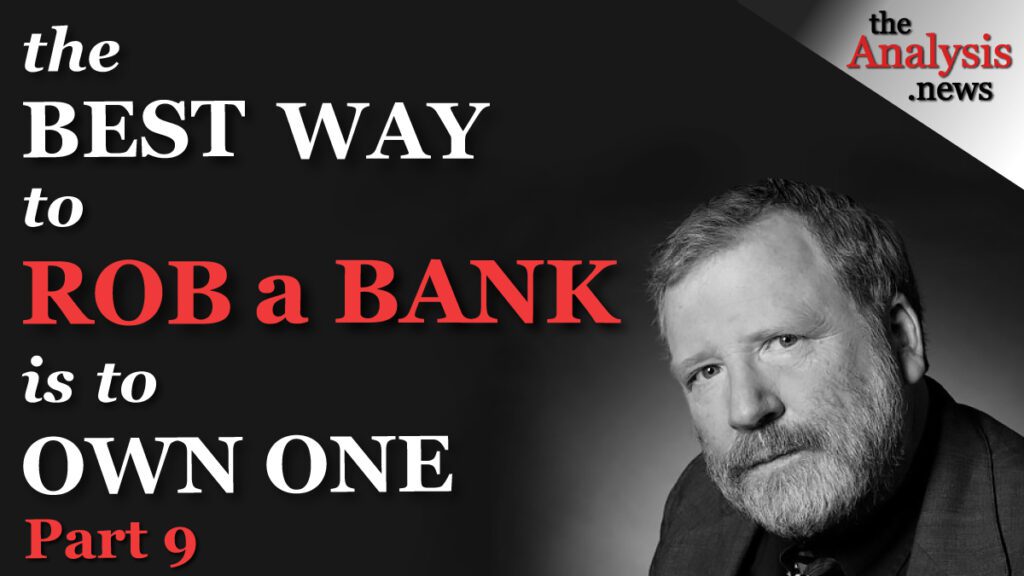
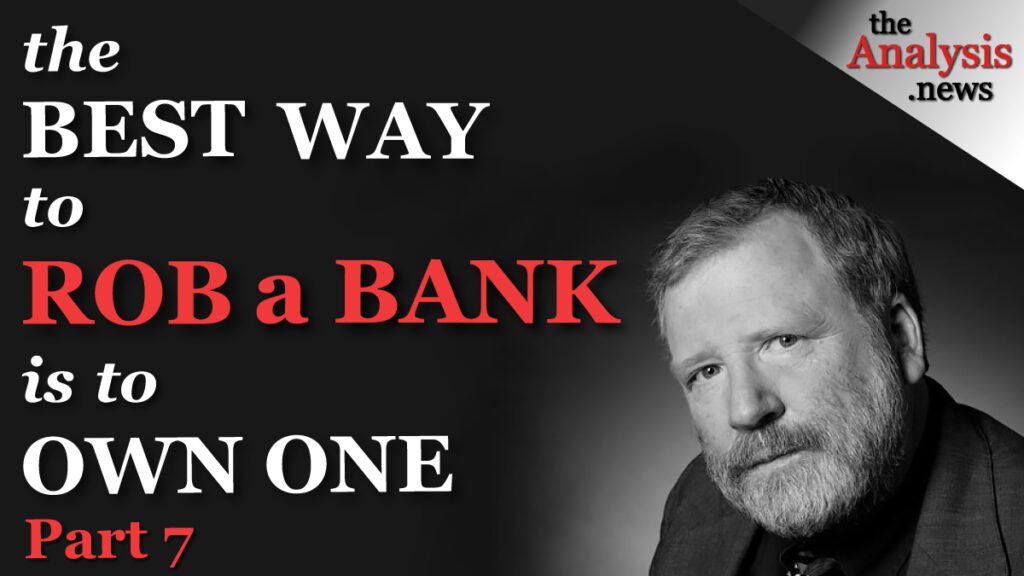
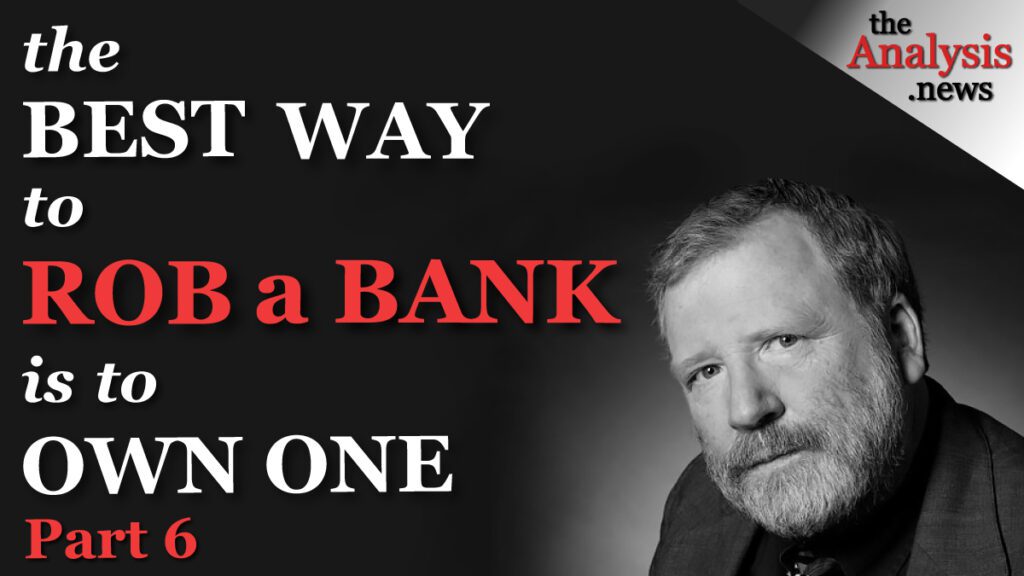
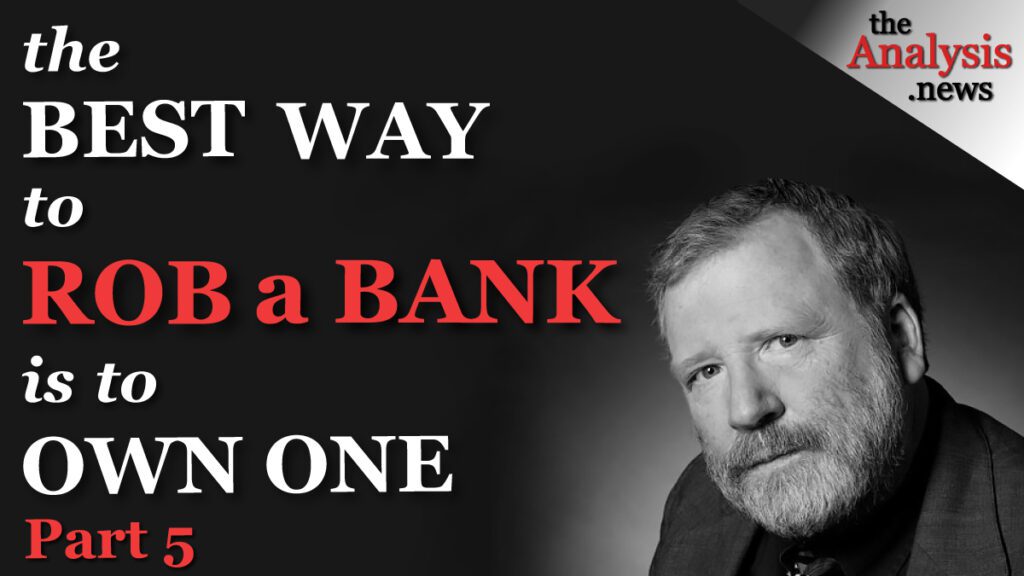
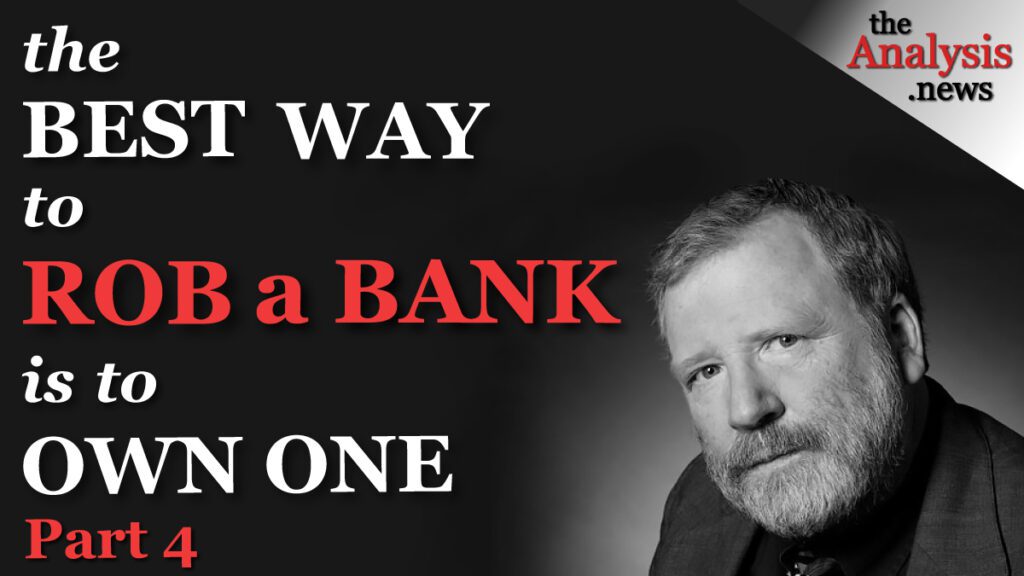
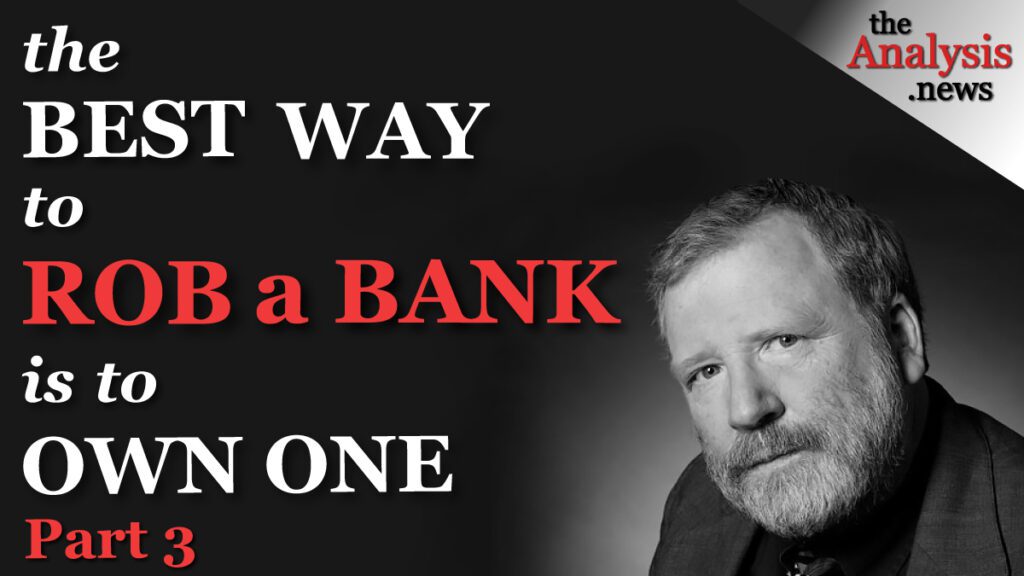
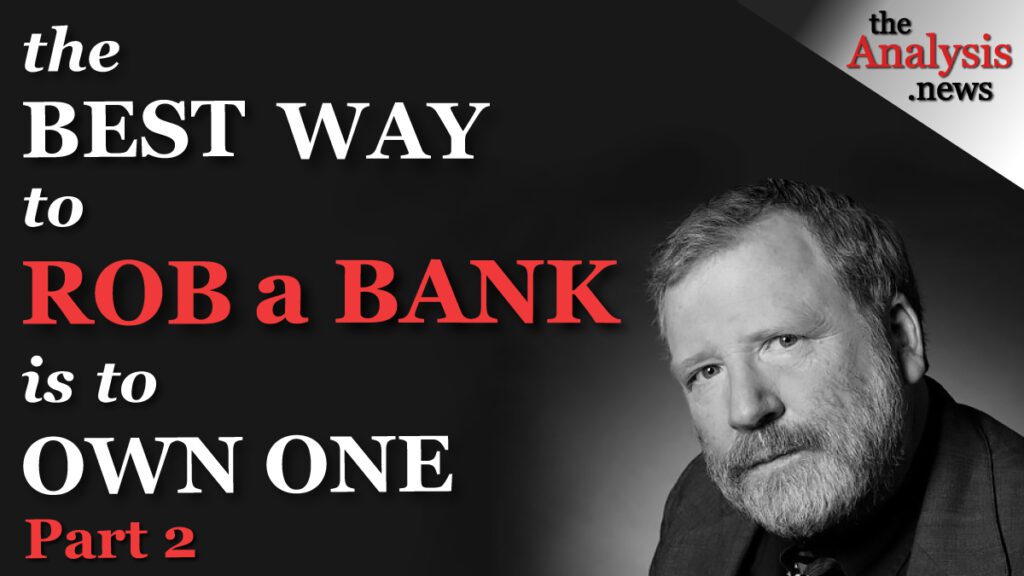
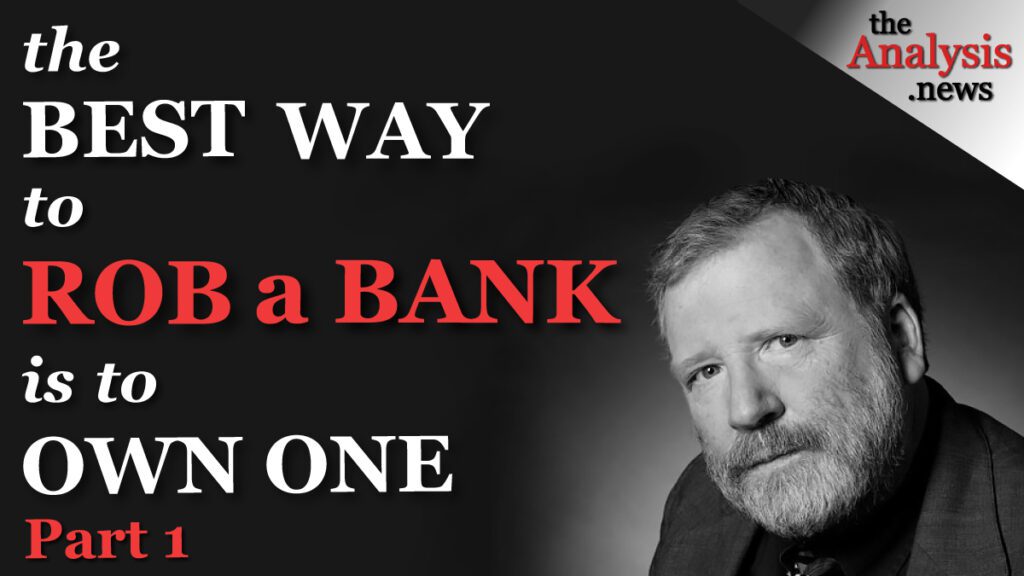
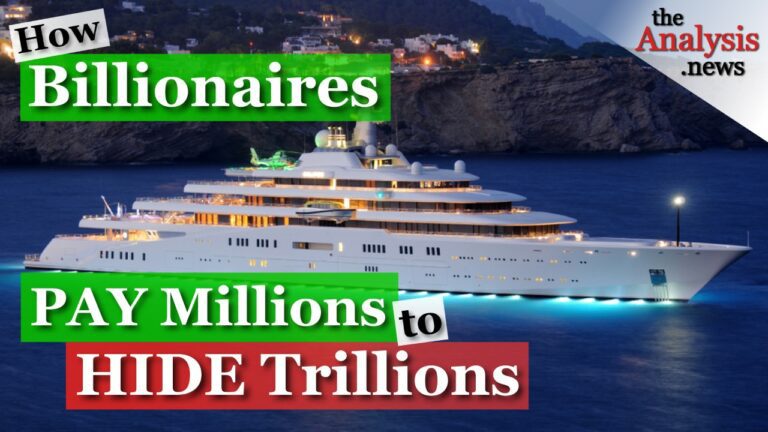
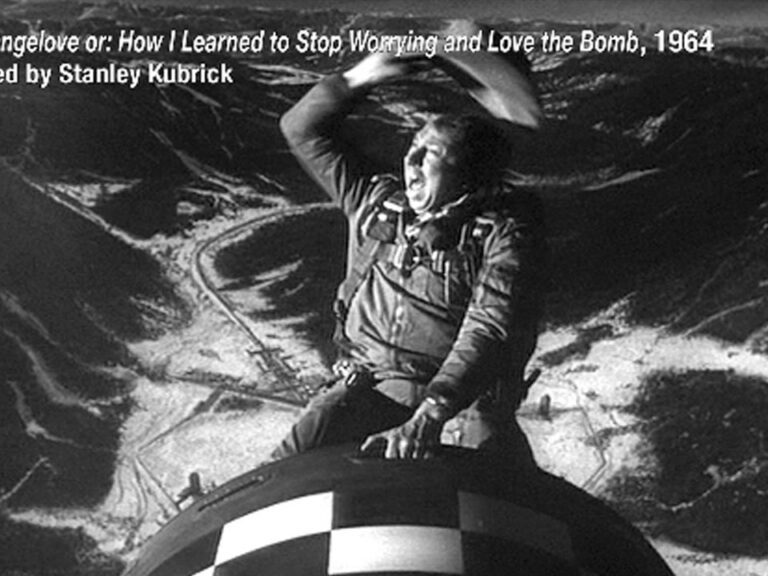
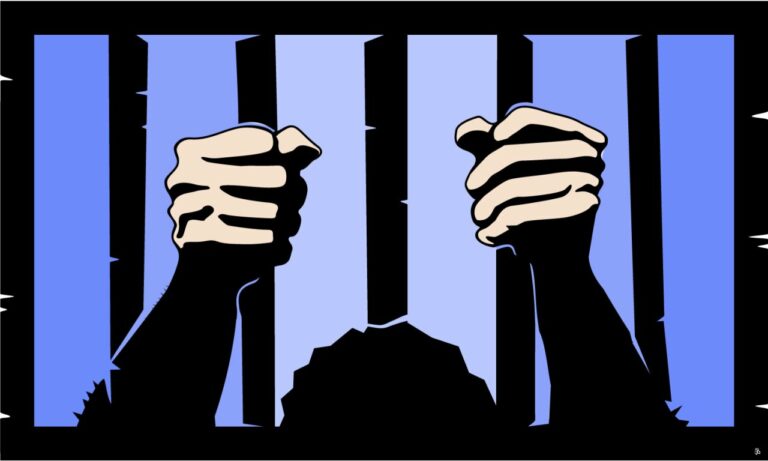



Possibly the conduct scorned “luddite” was ascribed to the extremely competent and sensible 19th Chair, Sheila Bair. A remarkable American known to intelligent people for her economic wisdom and affinity for the Common Good.
Bill Black:…”So, again, Congress, Republicans in Congress are deliberately making it so that we cannot effectively even understand what these people are doing, much less counter it.”…
Is Bill saying Republicans as a (Republican Party) policy are doing so, or is it simply that the Democrat Party is just as corrupt, but were beaten to the punch, or rather the feeding trough? I ask this as I can see Obama being fully supportive of this sort of negative faith/bad faith act, as long as it gets him another mansion or lifelong paid golf club membership (and some dump truck loads of those Tubman speaking fees and book purchases).